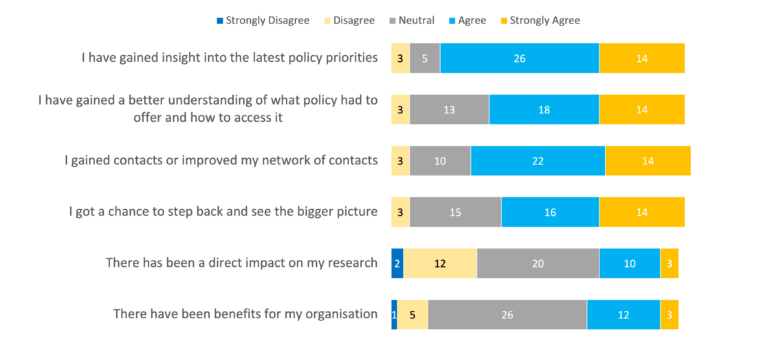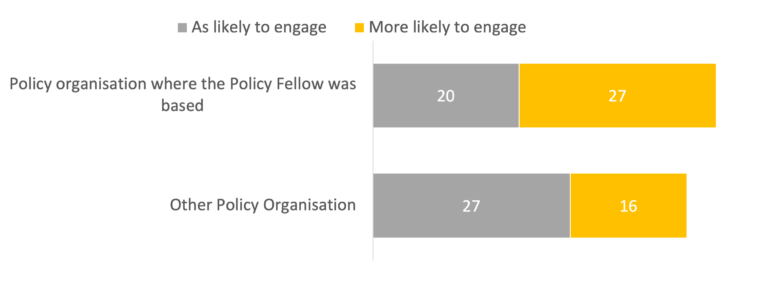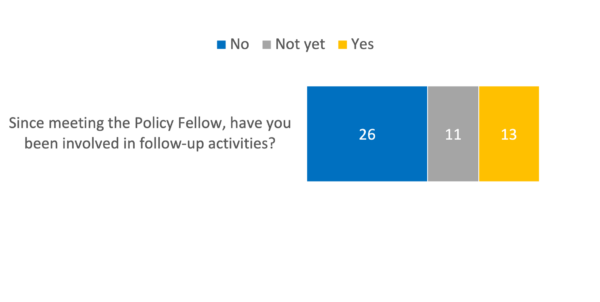Between 2021–23, CAPE invited professionals working within policy organisations to bring their policy questions to academics at our university partners. We designed a bespoke programme of engagement for each ‘Policy Fellow’, which was designed to bring them into contact with a diverse group of researchers. Over three years, 43 policy professionals met nearly 400 academics through our Policy Fellowships Programme.
Researchers form the backbone of knowledge exchange and it is important to understand the value of these meetings for policy professionals and academics to support more meaningful policy-academic engagements. It is also important to communicate the benefits of such meetings to academics to ensure that Policy Fellowships continue to provide a viable path for academic-policy engagement.
What do academics get out of these meetings and what can be done to foster more meaningful interactions and deeper relationships between Policy Fellows and researchers? To help answer these questions, CAPE surveyed the academics that met with our Policy Fellows.
Key findings
- Opportunities to engage with policy makers can situate academics and their research within key policy priorities and help researchers better understand the complexities and challenges associated with policy making
- Meetings with policy fellows may not have direct impacts on an academic’s own research
- Policy Fellowship Programmes can enhance the networks of participating academics and can lead to increased motivation and opportunity for further engagement
- Barriers to follow-up engagement can include lack of resources for activities and unclear pathways for future interactions
The survey
Between July 2021 and September 2023, 50 academics that met with CAPE Policy Fellows completed a survey on their experiences of these interactions. Respondents were based at Cambridge (25), UCL (11), Nottingham (4), Northumbria (3), Manchester (3), and at other institutions (4). The survey consisted of a mix of free text question boxes and closed questions where participants used a scale to respond to various statements (Figure 1).
The results

Figure 1: Surveyed Researchers Responses.
Meetings provide valuable insights into policy and policy making
Researchers were broadly positive about the opportunity to have stimulating conversations and to better situate themselves as part of a wider process that feeds into policy making.
“It reinforced my conviction that multi-disciplinary, multi-sector, multi-agency approaches are required to meet current governmental and societal challenges and these types of exchanges are of great value.”
“[…] industry/policy are very much linked to academia, and the two can and should inform each other. It also helped me remember how specific projects are in policy-making and as such forced me to offer insight and material that was narrowed down to a specific project – but without losing sight of the bigger picture. I also learned more about the current aspirations of the Department […]”
Respondents came away from meetings with new learning and insights into the policy making process and how academics could engage with it. Particularly, researchers had a new appreciation for the challenges associated with implementing policy and with implementing learning from an academic environment within a policy context. Respondents said that meeting someone in policy gave them:
“(1) A better understanding of how I could present my research to fit the political context at any given time; (2) Familiarity with the policymaking landscape – including who the key players and what drives their work; (3) Importance of communicating evidence and insights as clearly as possible.”
“Much clearer information on where policy is being implemented, changed, and path dependencies altered (fast moving under current government); What the current thinking is from Minsters and senior civil servants; Plans for the short, medium and long term; Contingencies they are planning; Where civil servants are gathering their varied knowledge bases from; What some of the barriers/difficulties they are facing to undertake their jobs; How they fill in gaps in knowledge; Where are their first ports of call for new knowledge”
Several researchers explained that they enjoyed the opportunity provided by the meetings to operationalise their research and to “bridge the gap” between policy and research.
“Meeting with a CAPE fellow provided an invaluable opportunity to see and discuss first-hand the practical implications of my research. In particular, having the chance to propose solutions to live issues reflects this initiative’s efficacy in forging a dialogue between researchers and those close to policy-making.”
“It was helpful to hear about policymaking from the perspective of someone who works with a central government department which provides funding to local authorities, since I work with local authorities who need to interact with central government.”
The responses indicate that the meetings allowed researchers to step beyond their own work and to get a better sense of the policy world and how their own research and expertise can have impact. Researchers were also cognisant of divides between academics and practitioners and one participant noted that practitioners may have difficulty getting access to academic articles and publications.
However, it should be noted that the experience was not universally positive. One participant explained that they left the meeting realising “it is very difficult to exchange meaningfully when discussion partners have very different research goals”.
Meetings had limited impacts on research
The Policy Fellowships programme is demand-led, meaning that it is primarily driven by the policy maker’s needs. Accordingly, relatively few researchers actively agreed that meetings with Policy Fellows yielded direct benefits to their organisations or had a direct impact on their research. When invited to suggest improvements to the meetings, several respondents commented on the one-sided nature of the interactions:
“I think the meetings tended to be one-sided, i.e. questions from the fellows and answers from researchers rather than a dialogue. […] I don’t think that I was informed sufficiently about potential benefits of the occasion to the researchers and how we could follow up these sessions to deepen our connections with fellows and better contribute to policymaking.”
“It would have been good to learn more about how research might inform policy, and the priorities / concerns of the fellow. The Q&A format – with the fellow asking questions and I answering – did not allow for exploration and mutual learning. It was also a shame that we did not receive any feedback from the fellow as to how useful or not the meeting had been. The meeting felt too one-way – a more dialogic space would be better.”
Some academic participants felt constrained by the structure of the meetings and explained that they did not have enough information to make the best of the meeting.
There is appetite for further engagement from researchers
78% of respondents agreed or strongly agreed that they had enhanced their networks through meeting Policy Fellows. There are some indications that the meetings increased the likelihood for further engagement for researchers. When participants were asked about their likelihood to engage further with policy organisations, all indicated that they were ‘as likely to engage’ or ‘more likely to engage’ (Figure 2).

Figure 2: Likelihood to engage with policy organisations
However, when asked if they had pursued additional activities, just over half of participants indicated that interactions went no further than the meeting itself (Figure 3).

Figure 3: Follow-up Activities
Post-meeting engagements ranged from sharing contact information, email follow-ups, and sharing resources to more substantial interactions such as:
• Introducing Policy Fellows to other relevant researchers
• Subsequent meetings
• Presenting research to civil service departmental teams
• Inviting Policy Fellows to take part in national and international conferences
• Feeding into an All-Party Parliamentary Group inquiry
• Inviting Policy Fellows to roundtable activities
• Bidding for funding from the Policy Fellow’s organisation
There are barriers to follow-up engagement
Respondents exposed some of the tensions that make follow-up engagements more difficult. Researchers explained that their ability to collaborate with Policy Fellows was impeded by funding restraints and, in some cases, by the isolated nature of the initial interaction.
“We ended up running a session with our CAPE fellow’s team. It was very useful – but unfortunately there was no funding to follow-up and continue the work.”
“One off interventions — even if they exist in the form of a secondment/fellowship — rarely lead to the change required. What would have been useful would have been funding to start a more in-depth programme of work to help resolve the challenges of the fellow.”
“Follow-up meetings might be useful to generate further and concrete impacts. Small funded projects would be particularly useful. If my case, both the policy fellow and I were interested in a concrete idea, so a bit of funding to get this started would be very helpful to build a network and have impacts.”
There is appetite for follow-up engagement with Policy Fellows, however, the programme’s set-up meant that it was sometimes difficult to catalyse new opportunities. While it is standard practice to leave follow-up arrangements to the initiative of the researcher and the Policy Fellow, there may be scope for knowledge exchange professionals to identify pathways or opportunities for subsequent engagement where there is mutual interest and to communicate these to researchers. Policy Fellowships could be the first step towards much deeper academic-policy engagements.
Summary
Policy Fellowships are supported by academic researchers who give their time to share expertise with Policy Fellows. It is important that the researcher experience is taken into account as Policy Fellowships develop in future.
What we found within CAPE is that researchers find real benefits when meeting Policy Fellows. These meetings informed researchers about policy priorities and policy making as well as enhancing their networks. While a lack of resources and structured follow-up pathways may present barriers to further activity, there is appetite and opportunity to develop sustained relationships between researchers and Policy Fellows beyond initial meetings that could support new academic-policy engagement collaborations.
You may also be interested in: Hosting Policy Fellowships: A Guide for Higher Education Institutions (Dec 2022)
About CAPE
Capabilities in Academic Policy Engagement (CAPE) is a knowledge exchange and research project funded by Research England from 2020-2024, which has been exploring how to support effective and sustained engagement between academics and policy professionals. The project is a partnership between UCL and the Universities of Cambridge, Manchester, Northumbria and Nottingham in collaboration with the Government Office for Science, the Parliamentary Office for Science and Technology, Nesta and the Transforming Evidence Hub.
About CAPE blogs
CAPE blogs have been written by members of the CAPE team reflecting on their learning and experience of academic policy engagement using practice-based evidence from the project.


